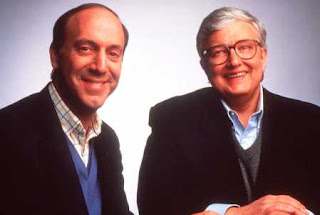Siskel and Ebert
In retrospect, it was a strange, but important show for me to have watched.
 Strange because Siskel & Ebert clearly wasn’t designed for children. Stranger still because I only went to the movies about once or twice a year growing up, and when I did go it was rarely based on the critical recommendations, more often on what was cool at the time or what my sister and grandmother wanted to see (e.g., Home Alone, The Englishman Who Went Up a Hill But Came Down a Mountain).
Strange because Siskel & Ebert clearly wasn’t designed for children. Stranger still because I only went to the movies about once or twice a year growing up, and when I did go it was rarely based on the critical recommendations, more often on what was cool at the time or what my sister and grandmother wanted to see (e.g., Home Alone, The Englishman Who Went Up a Hill But Came Down a Mountain).
Important because Siskel & Ebert offered me my first taste of what meaningful criticism could sound like. My fellow children divvied cinema into one of two categories: the movies that were “awesome” and movies that “sucked”--with the occasional added nuance that an awesome movie was funny, or a sucky movie was boring. When you get down to it, most adults aren’t that much more scientific, offering thinly veiled, oddly equivalent assessments about all kinds of art that they simply do or do not like.
Siskel and Ebert were different. They analyzed. They dissected. They explained. And while they were both bright, articulate men, they rarely wallowed in jargon and the technical aspects of film, instead laying down critiques built to be accessible to the common man, before they distilled all of their careful thought and rationalization back down to the simplest evaluation possible: a vote of thumbs up or thumbs down for each movie.
Siskel and Ebert argued. Much of the show’s audience probably remember it best for those moments when one or both of the Chicagoans lost his cool--equal parts passionate about film and caught up in the spirit of argument. And yes, these confrontations were entertaining. But far more important, at least for my own development, these arguments demonstrated that two smart people could hold wildly divergent, no less valid points of view.
Since the age of eighteen, I have as often as not been involved in some form of writer’s workshop, be it as a formal class or an informal gathering of friends, electronically or in person. I like to think that some of my critical eye, as well as my ability to accept criticism as valuable and important (even when I don’t agree with it) stems from early exposure to two of the finest critics of my lifetime.
And there’s my role in the world of a cappella music. Most people who know me from this segment of my life are surprised to hear that the guy who posts upwards of one hundred columns about a cappella each year, and who writes 5,000-word reviews about ten or so major shows a year never actually sang with an a cappella group. And, inevitably (and as recently as this past weekend) I find myself comparing my work to that of America’s best-known critic, Roger Ebert. Ebert was never a filmmaker and Ebert didn’t concern himself with highfalutin language or technical snobbery. He made smart arguments in an accessible way, and in doing so, educated and influenced a generation of movie-goers. I do not put myself on Ebert’s level (or even particularly close to it) as a critic. Nonetheless, his work is what I aspire to in the a cappella realm.
Gene Siskel passed away in 1999, an absurdly long time ago, it seems, as I reflect on him this evening.
Rober Ebert died today after a long battle with cancer. He hasn’t been physically capable of speech for years, but still regularly published film reviews for the The Chicago Sun-Times and posted some truly profound thoughts on his underappreciated personal blog.
In a sense, Ebert’s passing could mark the end of an era. It could mean that great criticism has died with its vanguard.
I prefer to think that Siskel and Ebert left the world a better place. While no critic may yet have risen to match their clout or notoriety, they gave birth to a wide cross-section of magazine columnists, magazine reviewers, and bloggers. Smart people who are putting real thought into their criticism, and in so doing pushing artists further and making audiences think a little harder.
For that, the world is a better place.
Rest in peace, Siskel and Ebert. The balcony is closed.

Comments
Post a Comment